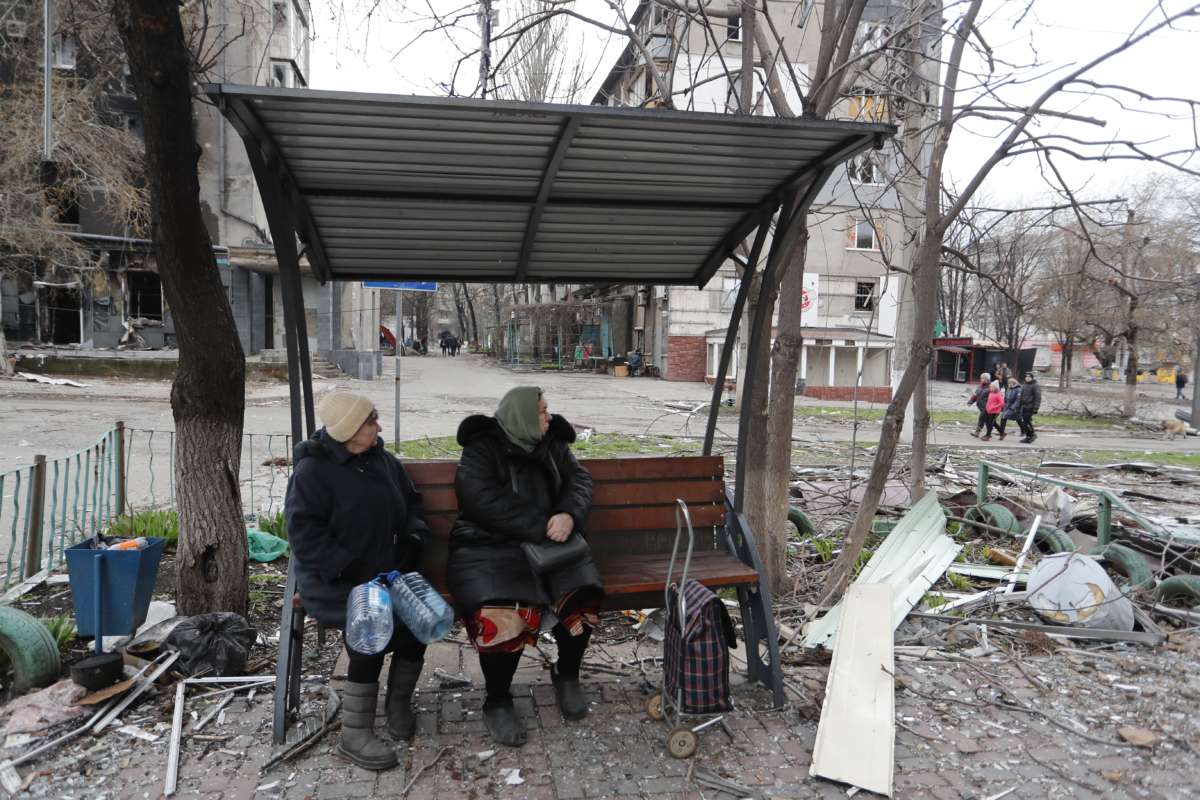Support justice-driven, accurate and transparent news — make a quick donation to Truthout today!
David Beasley, executive director of the United Nations World Food Program, is sounding the alarm about people being “starved to death” in Mariupol, a city in southeastern Ukraine surrounded by Russian troops.
In a Thursday interview with the Associated Press, the WFP chief predicted that the humanitarian crisis in Ukraine is likely to grow worse in the weeks ahead as Russian President Vladimir Putin intensifies his deadly assault on the Donbas region and beyond.
The invasion that began on February 24 is “devastating the people in Ukraine,” said Beasley, who decried aid groups’ inability to access civilians in need amid Russia’s unrelenting onslaught.
“I don’t see any of that easing up,” he said. “I just don’t see it happening right now.”
According to AP:
Beasley expressed particular concern about the port city of Mariupol, where a dwindling number of Ukrainian defenders is holding out against a Russian siege that has trapped well over 100,000 civilians in desperate need of food, water, and heating.
Russian forces that control access to the city have not allowed in aid, even though the WFP has demanded access.
“We will not give up on the people of Mariupol and other people that we cannot reach,” Beasley told the news outlet. “But it’s a devastating situation: the people being starved to death.”
In addition to the logistical hurdles that humanitarian organizations are facing as a result of Russian attacks and blockades, the diversion of Ukrainian workers and fuel to the war effort is also making it harder to deliver lifesaving assistance.
“It’s not just going to be the next few days — but the next few weeks and few months could even get more complicated than it is now,” said Beasley. “In fact, it’s getting worse and worse, concentrated in certain areas, and the front lines are going to be moving.”
Earlier this week, Putin said that Russia would shift the focus of its military offensive from areas around the capital of Kyiv to eastern Ukraine, including Mariupol. AP reported that Moscow is determined to seize the port city “so its forces from the annexed Crimean Peninsula can fully link up with troops elsewhere in the eastern Donbas region, Ukraine’s industrial heartland.”
“The fluid nature of the conflict… has made it especially difficult to reach hungry Ukrainians,” AP noted. “The WFP is trying to put food supplies now in areas that could be caught up in the fighting, but Beasley acknowledged that there are ‘a lot of complexities’ as the situation rapidly evolves.”
Despite Putin’s recent comments about limiting the geographical extent of his attack, for instance, Russia on Friday resumed its bombardment of Kyiv.
Reiterating his warning from last month that “the bullets and bombs in Ukraine could take the global hunger crisis to levels beyond anything we’ve seen before,” Beasley said Thursday that the disastrous consequences of Russia’s war will continue to reverberate around the world.
As agricultural output from one of the world’s most productive growing regions has slowed substantially, exports have diminished and the prices of key food staples and fertilizer have climbed to record highs.
According to AP:
Russia and Ukraine together produce 30% of the world’s wheat supply and export about three-quarters of the world’s sunflower seed oil. Half of the grain the WFP buys for distribution around the world comes from Ukraine.
Some 30 million metric tons of grain bound for export are unable to be shipped because of the war, Beasley said. Ukrainian farmers are struggling to access fertilizer and seed, and those who can plant may see their harvest rot in the fields if the war drags on and there’s no way to ship it, he warned.
The shipping challenges have forced the WFP to halve rations for millions of people, many in Africa, and more cuts may be needed, he said.
As Common Dreams has reported, Russia’s war on Ukraine is exacerbating extreme poverty and undernourishment for tens of millions of people throughout the Global South, including in the occupied Palestinian territories, several countries in the Middle East and North Africa, and in parts of East Africa.
The situation is particularly dire in drought-stricken and war-torn nations such as Yemen — where the U.S.-backed, Saudi-led military assault has entered its eighth year — and Afghanistan, whose central bank reserves have been seized by the Biden administration.
In Latin America, fertilizer shortages are already hurting poor Peruvians, contributing to unrest and throwing the political future of leftist President Pedro Castillo into doubt.
“People are going to be starving to death,” Beasley said, adding that hunger intensified by the conflict in Ukraine could prompt “mass migration beyond anything we’ve seen since World War II.”
A terrifying moment. We appeal for your support.
In the last weeks, we have witnessed an authoritarian assault on communities in Minnesota and across the nation.
The need for truthful, grassroots reporting is urgent at this cataclysmic historical moment. Yet, Trump-aligned billionaires and other allies have taken over many legacy media outlets — the culmination of a decades-long campaign to place control of the narrative into the hands of the political right.
We refuse to let Trump’s blatant propaganda machine go unchecked. Untethered to corporate ownership or advertisers, Truthout remains fearless in our reporting and our determination to use journalism as a tool for justice.
But we need your help just to fund our basic expenses. Over 80 percent of Truthout’s funding comes from small individual donations from our community of readers, and over a third of our total budget is supported by recurring monthly donors.
Truthout has launched a fundraiser, and we have a goal to add 273 new monthly donors in the next 72 hours. Whether you can make a small monthly donation or a larger one-time gift, Truthout only works with your support.
